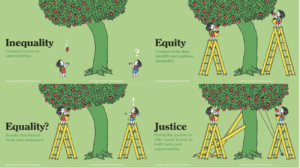As brand and communications specialists, it’s no surprise that we’re acutely aware of the impact language has for businesses. The vocabulary, phrasing and tone of your messaging can mean the difference between a successful campaign or a HR disaster, and the way you choose to speak to your audience speaks volumes.
When thinking about social justice work, this becomes even more important. In a landscape where more people than ever before are trying to be part of meaningful change, the terminology and language we use continually evolves as we come to better understand and prioritise the needs of various communities. If organisations and brands, who trade on their commitments to inclusive brand culture, want to be trusted and taken seriously, it’s important that they stay up to date with the latest contextual changes to both language and meaning.
For example, in recent years, the conversation around social justice has shifted from a focus on equality to a focus on equity. Simply put, this is because while equality sounds like it means everyone is treated the same, what it really focuses on is giving everyone the same resources. If we lived in a meritocratic society, this would be fair, however it’s undeniable that our race, class and a wide range of other factors impact our social mobility, which can limit our potential.
However, once we start talking about equity, the onus shifts to ensuring everyone has the same access instead. This means taking a more thorough and holistic approach to levelling the playing field, and taking action based on what communities actually need. It’s a move away from lionised-thinking and lazy assumptions, and shows a genuine desire for parity instead of equality for optics sake. This shift has been reflected in the way we talk about and approach issues of diversity, inclusion, and belonging, with a growing emphasis on the importance of understanding and addressing systemic barriers to opportunity and success.
The use of equity vs equality is a good example of how deeply language can impact the behaviour of businesses. Many of the organisations we speak to across sports, entertainment and even the third sector are still focusing on equality. However, that positioning isn’t robust enough to create the changes that they say they are committed to, because it fails to consider the inherent inequality many people face.

Equity is considered a better position than equality when thinking about EDI because it recognises that not everyone starts from the same place and that some individuals and groups have been historically marginalised and disadvantaged. Equality would mean treating everyone the same regardless of their background or circumstances, which would not address the existing power imbalances. On the other hand, a commitment to equity acknowledges these inequalities and seeks to correct them by providing different levels of support or resources based on an individual’s needs or circumstances.
For example, in education, equality would mean that all students have access to the same resources and opportunities, but equity would mean providing additional resources to those that need them. This would include things like targeted support for students from disadvantaged backgrounds or extra time in exams for those with learning disabilities to help them navigate the challenges they face and give them a fairer chance of success.
In other words, equity acknowledges that “equal” opportunities are not enough to correct the imbalance in society and that some people may need extra support to achieve equal outcomes. By focusing on equity, organisations can work to create a more inclusive and just society where everyone has the opportunity to succeed.
One of the leading voices in this area is Shereen Daniels, a UK-based thought leader in anti-racism at work, and author of ‘The Anti-Racist Organisation’. In her book, Daniels argues that true equity can only be achieved when we understand and address the ways in which systemic racism and other forms of oppression create and maintain unequal outcomes.
Daniels’s work highlights the leading role organisations can take in the fight for true equity by acknowledging the importance of not only promoting diversity and inclusion, but also actively working to dismantle the systems that perpetuate inequality. By truly embedding equity into their brand strategy and the way they communicate their commitment to this work, businesses can help create change by nurturing working environments where all employees have access to what they need to achieve. This helps protect against discrimination and can also change the way we think about and approach social justice and our roles within it.
Organisations, such as charities and not-for-profits, have the opportunity to lead the way in this work, as they should already have purpose and social good at their heart. Making a change from equality to equity isn’t a case of semantics or a trend-led update. It’s taking time to truly understand what is required if your brand stands for racial justice, gender equality or any other fight against systemic oppression. This nuance in language also elevates your brand perception, so your audience can instantly tell your organisation is informed and understands the depth of its EDI commitments.
Social justice language matters because it’s how we connect with other people, and after all people is what the entire movement is all about.


